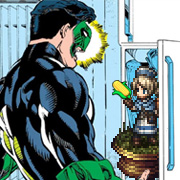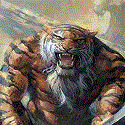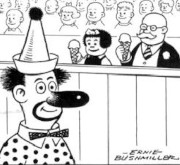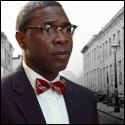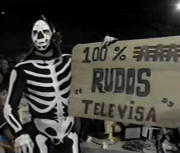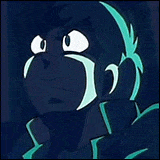|
Flesh and Steel by Guy Haley. Another goon recommendation. Two detectives from different law enforcement divisions are put together to solve a crime that is very reminiscent of the Danish TV series The Bridge. Set in the Warhammer 40K Universe, the story features Probator Noctis, a wealthy man slumming it in law enforcement against his family wishes, teaming with a tech priest from the Collegiate Extremis called Rho-1 Lux. In classic buddy cop style, they are two completely different personalities trying to work together toward a common goal. Noctis has a ton of emotional baggage and a drinking problem, while Lux is balancing the cold dispassion of a tech priest with her own empathic humanity. It's a good mystery, with very strong noir overtones. Haley doesn't neglect the Warhammer setting, with all its misery, horror, and small lives being crushed by forces beyond their control. The interplay between Noctis and Lux is well done. I especially enjoyed Lux's character, and her quiet displays of the woman behind the tech priest religion and growing cybernetic augments. This was part of the Warhammer Crime series. I've already ordered another volume in the series based on the strength of this one.
|
|
|
|

|
| # ? Jun 12, 2024 02:21 |
|
Gleisdreieck posted:The Tactical Guide To Women by Shawn T. Smith thought this sounded weird and lol within seconds of reading the amazon sample see evo psych being taken seriously
|
|
|
|
fez_machine posted:thought this sounded weird and lol within seconds of reading the amazon sample see evo psych being taken seriously Can you elaborate? What's so bad about evolutionary psychology? Has it been discredited?
|
|
|
|
fez_machine posted:thought this sounded weird and lol within seconds of reading the amazon sample see evo psych being taken seriously The Tactical Guide to Women delivers a solid plan for allowing the right women into your life, and keeping the wrong ones at a safe distance. You’ll discover how to: Identify good women of low drama and high character Reduce your vulnerability to women who seem perfect for you—but aren’t Spot the early warning signs of emotional instability Yikesaroo
|
|
|
|
Gleisdreieck posted:Can you elaborate? What's so bad about evolutionary psychology? Has it been discredited? Evo psych is filled with truthy statements and guesses that can't reliably falsified essentially There's been many pop debunks but here's the latest https://youtu.be/31e0RcImReY?si=1XUd3YXH1XSodLyY Here's the Wikipedia controversies page https://en.m.wikipedia.org/wiki/Criticism_of_evolutionary_psychology fez_machine fucked around with this message at 08:10 on May 20, 2024 |
|
|
|
Gleisdreieck posted:Can you elaborate? What's so bad about evolutionary psychology? Has it been discredited? That reads like PUA horseshit. What sort of hat does it advise you to wear? (Indoors)
|
|
|
|
fridge corn posted:The Tactical Guide to Women delivers a solid plan for allowing the right women into your life, and keeping the wrong ones at a safe distance. You’ll discover how to: You actually got past the title before figuring out it was PUA/incel shite under a thin veneer? Also, let it be noted that tactics are used to manage a single situation in progress while strategy is establishing a long term plan with goals. So this is literally a book "explaining" how to date a woman exactly once. In that, I expect it succeeds admirably.
|
|
|
|
fez_machine posted:Evo psych is filled with truthy statements and guesses that can't reliably falsified essentially Assuming the worst case scenario that it's all unscientific and unfounded, the book is still a great collection of life experiences and client cases, both good and bad. The author assures he is happily married and that his approach worked out very well for him. Convinced me enough that his methods are worth trying out. He encourages to treat women with respect, there is no misogyny or sleaziness.
|
|
|
|
The aggregate goon is generally pretty hostile to the subjects of evopsych, pickup artists and manuals on how to meet women. I'd recommend not bringing these topics up here.
|
|
|
|
Gleisdreieck posted:Assuming the worst case scenario that it's all unscientific and unfounded, the book is still a great collection of life experiences and client cases, both good and bad. The author assures he is happily married and that his approach worked out very well for him. Convinced me enough that his methods are worth trying out. If we're assuming the worst case scenario then those life experiences and client cases are fabricated (which would be par for the course with a PUA book). The cover blurb quoted upthread demonstrates that you don't even need to open the book to find the misogyny and sleaze
|
|
|
Gleisdreieck posted:He encourages to treat women with respect, there is no misogyny or sleaziness. Oh, in that case. The framing alone is misogynistic as well. It is misogynistic to have a handbook for women, let alone a “tactical handbook”. It’s dehumanizing. The reason that it’s dehumanizing is that women are not a class of thing for which you can have a handbook. Women are literally half of all humanity. They are as varied and nuanced as humanity itself. To create a handbook to explain them is to erase that complexity and assume that women are as complicated as things that have handbooks, like dishwashers, or tactical handbooks, like platoon attacks. Consider how racist a “tactical handbook to Black people” would necessarily be. This is the same but for women. I haven’t read the book but the reason the author gives for respecting women matters a lot as well. Is it to get something from them? Is it part of the tactics? That would be bad too.
|
|
|
|
|
The Game by In the age of the second secularism, where the traditional cultural centers of love and dating have fallen, Moby-With-A-Goatee teaches us how to navigate and succeed with “women” using a lunchbox of magic tricks. Not a metaphor. Literal lunch box. 5/5 bald heads.
|
|
|
|
Oh, in that case. The framing alone is ageist as well. It is ageist to have a handbook for middle schoolers, let alone a “survival guide”. It’s dehumanizing. The reason that it’s dehumanizing is that middle schoolers are not a class of thing for which you can have a handbook. Middle schoolers are literally half of all humanity. They are as varied and nuanced as humanity itself. To create a handbook to explain them is to erase that complexity and assume that middle schoolers are as complicated as things that have handbooks, like women, or women handbooks, like women attacks. Consider how ableist a “tactical handbook to Cripples” would necessarily be. This is the same but for middle schoolers. I haven’t watched the show but the reason the writers give for respecting middle schoolers matters a lot as well. Is it to get something from them? Is it part of the tactics? That would be bad too.
|
|
|
|
tuyop posted:Oh, in that case. Please stop kink-shaming the hetero-normative person. If reading that book gets them out and having consensual fun, let it go. I finished San Fransicko: Why Progressives Ruin Cities . The book is a critique of liberal policy, mostly around drug use and vagrancy, by a self described liberal. It included multiple out of place references to Christianity and oddly hostile comments that don't fit the rest of the book. The title itself is also confrontational in a way that doesn't jive with most of the text. I assume all of this was added by an editor to appeal to the talk radio crowd, as the underlying message of the book is reasonable and well argued.
|
|
|
|
David Copperfield has its problems. It's got Dickens' cloying sweetness, all treacly and overbearing (which is nice in small doses). It's stupendously long and doesn't necessarily earn its length. The characters are mostly one-note caricatures, neatly divided between good and evil. The ending feels like Dickens realized he'd gone on for too long and had to scramble to wrap it all up as happily as possible. But it's a story that's brought too much comfort to me in children's abridged form, and I'm glad to have the whole thing. I won't be eager to read another Dickens for many years, though! FPyat fucked around with this message at 10:41 on May 24, 2024 |
|
|
|
Bookshelves & Bonedust Travis Baldree. The prequel to Legends & Lattes. Not entirely more of the same but bloody similar. Viv got injured while just starting her murder hobo career and needs to rest up in a port town, that has a bookshop. Shenanigans and a love of books ensue. (Not to mention rumours of a famous bodice-ripper writer nearby) If you enjoyed the first one, and love books, you'll love this'n. Also, the named bodice-ripper book has the perfect name.
|
|
|
|
i finished A Happy Death by Albert Camus. its pretty easy to understand why this ended up getting scrapped in favor of a rewrite geared more towards disconnection rather than, interestingly, reconnection. i really enjoyed following this version of Mersault around desperate to bridge a connection to happiness and kinda arriving at it at the end but also not really. there's a bit where he obsesses over thinking about his life because one should think on life the same way we do great art-- an interesting contrast to the last half of the book that watches Mersault attempt to just live in the now. again, pretty interesting--the Mersault of The Stranger already starts this way. if you wanna entertain a crazy stretch, A Happy Death slots right into The Stranger--Mersault, learning "happiness", dies and gets another go. and well, you can read The Stranger to see how that all goes down. yeah that said the constant scenery descriptions were very lame attempts at capturing the sublime and just constantly constantly kept coming. Camus was right to cut that poo poo outta The Stranger.
|
|
|
|
Just finished The Winter Soldier by Daniel Mason. It was an engaging read. Hope I never have my intestines pouring out of me.
|
|
|
|
i dont feel like i could be convinced to read another Mason after how soap opera-y and flaccid North Woods was. but North Woods also had good ideas. so what makes The Winter Soldier so engaging?
|
|
|
|
cumpantry posted:i dont feel like i could be convinced to read another Mason after how soap opera-y and flaccid North Woods was. but North Woods also had good ideas. so what makes The Winter Soldier so engaging? The story was engaging; a young medical student with no experience gets pushed to a field hospital when WW1 starts. This was my first Daniel Mason book and I like his style so far.
|
|
|
|
In the Valley of the Headless Men by L. P. Hernandez Cosmic horror In the wake of their mother's death, two brothers travel to an obscure national park in Canada where tales of giants, ancient beasts, and headless men are common. The characters are really well done, the weirdness of the park is crafted in such a way that it eases you into it without you noticing. For readers who enjoyed Annihilation.
|
|
|
|
Poachers Caught! and More Poachers Caught! are a pair of autobiographical story collections by Tom Chapin, a former game warden in the US. The stories are interesting, occasionally funny and once or twice a bit sad, but through them all Tom is kind of the ideal guy you'd want in charge of the law. Focused on education and community outreach, never vengeful towards lawbreakers or thirsting for harsher punishments(aside from once or twice wondering if very slap-on-the-wrist judgments will actually teach them anything), never draws his weapon(or even mentions it) and generally solves problems simply by talking to people and being observant. He's also very self-effacing, not afraid to admit when something was a stupid idea or he messed up. Chapin gives every sign of doing his job because he likes people and nature both, and wants them to co-exist. Seems like a lovely guy. Wildlife Wars by Terry Grosz, on the other hand, is the exact opposite. It's supposed to be the same sort of thing, but already in the foreword the author's busted out "Thin Green Line" and the very first story is about how he singlehandedly defeats a gang of ten men, by karate-kicking their leader, a murderer, so hard that the rest of them are impressed by how strong he is and surrenders. Every chapter has multiple references to how big and strong he is, and he constantly talks about his gun, and rants about how he's a primal "hunter of men" and other such unhinged poo poo. Real cop trash. EDIT: Also forgot Terry Grosz does an aside at one point to explain that he has psychic powers that let him detect and catch poachers. I'm genuinely not making that up. PurpleXVI fucked around with this message at 02:02 on May 26, 2024 |
|
|
|
I see you and I follow at least one of the same threads.  I also bought and read these books and I feel the same way about them. Also, since I bought them for my kindle, my recs are now flooded with lovely self-published cop bios. Ugh, no, I don’t want to read about a state trooper congratulating himself on his career.
|
|
|
|
I just read the first Fletch book. is Chevy chase loving around with a fifteen year old in the movie too GoutPatrol fucked around with this message at 14:07 on May 27, 2024 |
|
|
|
Woom by Duncan Ralston. It was dreck. Extreme horror is dreck.
|
|
|
|
Xenofeminism by Helen Hester. I don't read a lot of pure academic theory like this so it was an interesting change of pace, and nowhere near as dense as I thought it might be once you wrap your head around a few basic concepts. The idea that the master's tools indeed can dismantle the master's house, you just have to re-purpose and re-imagine them, is one I'd like to see get discussed more and inform innovation to a greater degree.
|
|
|
|
Finished two this week: Election by Tom Perrotta Incredibly readable, but the non-election sub-plots were so much more interesting than the election stuff and all those died out in the second half of the book. Still, enough evidence of Perrotta as a strong writer so I'll continue my way through his bibliography. Arena by William R. Forstchen The first ever Magic: the Gathering book from 1994. Perfectly readable, but of course not going to transcend past its level. The fighting in the book evoking what is going on in a game of Magic, with as many card names as can be shoveled in, was cool, didn't think that would be captured so well. Was expecting it to be a generic fantasy novel with a few names shoved in, but it at least showed that Forstchen knew about Magic and tried to work that in. None of the lore-type names in the book ended up being anything. It appears the name "Benalia" wasn't in the game pre-5E, so this book is the origin of that? They did make a Garth One-Eye card for the main character in Modern Horizons 2 in 2021, and the flavor is a solid match to what happens in the book. Gonna keep reading these, the next is the Greensleeves Trilogy by Clayton Emery.
|
|
|
|
Wrapped Tender is the Flesh based on the recommendation from this thread. It ruled. It reminded me a lot of Atwood's Oryx and Crake trilogy - dystopian agribusiness ultrablack-comedy horror. Luxuriating in atrocities and then pulling back right before the reader becomes desensitized, diving in again after giving you room to breathe. My only beef (heh) is there were sections which felt almost disrespectful of the audience's intelligence, like the author took pages out of her own book's Sparknotes and stuffed them in with the prose. This was most apparent at the beginning of the novel, when all the exposition dumps were accompanied by explanations of the key themes. IE the description of all the new terminology for the cannibal meat, followed immediately by an explanation of how using euphemisms is dehumanizing and makes it easier to accept atrocities. As though it was not immediately obvious to the reader. mellonbread fucked around with this message at 16:48 on May 29, 2024 |
|
|
|
Boco_T posted:Finished two this week: Benalish Hero, with the flavor text about how "Benalia has a complex caste system that changes with the lunar year," was around back in Alpha.
|
|
|
|
Silver2195 posted:Benalish Hero, with the flavor text about how "Benalia has a complex caste system that changes with the lunar year," was around back in Alpha.
|
|
|
|
Noble Conspirator: Florence S. Mahoney and the Rise of the National Institutes of Health by Judith Robinson This book is an account of the life and influence of Florence Mahoney (and her collaborators, lobbyist Mike Gorman and better known activist Mary Lasker), whose greatest mark on history was successfully lobbying for the creation of entities that would grow into the National Institutes of Health (NIH), continuously increasing their budgets far out of proportion to other federal outlays, year over year, for several decades. Some background may help here, and thankfully it's a subject I already know something about! NIH is a weird organization- it's perhaps the greatest, most prestigious concentration of health research and knowledge in the world, it's a source of major funding for groundbreaking technologies and research, it's highly politically independent, and it's had a huge set of societal benefits. It's also quite hosed up; it's got all the backbiting and politics of the worst academic settings, and it's structurally set up to focus on funding moonshot last mile applied research and chase headlines at the expense of long term scientific infrastructure. The ongoing collapse of the broader academy due to the decline in stable general public funding has also put weird and distortive perverse pressures on NIH, reflected in recent scandals involving invalid and occasionally corrupt research - and, inversely, political attacks on parts of NIH that continue to function well (like NIAID). Most of this could be predicted from the political processes that created and funded NIH, which this book...sort of covers. The preface of Noble Conspirator states that in interviews with the author, Florence Mahoney emphasized that she wanted this book to focused on the issues, rather than on her. This book totally fails to honor her request. Much of the book is a veritable tongue bath for Mahoney, who still comes across as really unpleasant. Mahoney ultimately had her influence for pretty predictable reasons: she was the dilettante wife of the owner of a press conglomerate who relentlessly exploited her position to get her way. A standout example is Mahoney lending a member of Congress several original Georgia O'Keefe paintings for their office (a really obvious bribe), being passed off as perfectly normal and a great example of her generosity. Another has Mahoney getting national columnists like Ann Landers to spike the careers of NIH leaders she dislikes. Other disjointed anecdotes have Mahoney spamming Presidents, staffers, and others with individual research articles she'd been impressed by, a lot of them about treatments that had no scientific merit. Although the text presents Mahoney as a careful, understated networker who brought people together and let others do the talking, another reading is obvious: ultimately, these politicians were doing what Mahoney wanted because she had the power to get them money, or to harm their careers through columns in the newspapers she controlled- and because she could be so freaking annoying. The book spends almost all of its time on anecdotes about Mahoney's political connections, influence, and positive qualities, doing its best to avoid discussing her relative privilege, her tendency to use her access to promote pseudoscience, and, I suspect, some pretty unpleasant beliefs around mental hygiene and population control that appear to have influenced Mahoney's original interest in research funding. Form is little better than content, and both are a disappointment. Noble Conspirator appears likely to have been some sort of vanity project, as it was from a personal press that closed after the founder's death with few other publications, all apparently similar political biographies. The text is riddled with a variety of proofing errors; my favorite is an anecdote where the author has left in some [bracketed text] telling themselves to find the first name of the person being discussed! Individual anecdotes are thrown together with almost no coherent line of statement, other than a very, very loose chronological order. Almost no explanation of underlying policy issues is provided, which is glaring when you're describing several decades of Congressional appropriations. While there are some useful narrative segments that get into some of the details of individual lobbying cases and messaging, these are almost always taken whole cloth from other sources, including a separate biography of Mike Gorman, that were better written. The one redeeming quality is that the bibliography is nearly exhaustive and very well formatted- I will likely be making heavier use of it than the rest of the book going forward. The author clearly had a huge amount of access to both Mahoney and many other figures from the book (as well as their personal libraries); it's unfortunate that the result is so underwhelming. The Crowd: a study of the popular mind by Gustave Le Bon Hoo boy. I was recommended The Crowd because it's routinely cited as a founding, seminal text in propaganda theory, group psychology, and persuasion. It's a "classic," so, you know, I wanted to read it. Well, those sources didn't mention it's a pretty clear influence in the development of the political theory of fascism! Le Bon was a polymathic figure in France at the turn of the century who wrote The Crowd in response to what he saw as limiting discussions of the criminal psychology of crowds, and in response to the shifting dynamics of society at the fin de sičcle. There are, uh, some genuinely useful and novel observation here for the time, if you want to dig through a pile of garbage:
Crowds are innately stupid and will tend to fixate on basic imagery-based, illusory, morally commanding beliefs. This is a constant theme throughout the piece. Everything else in history- inventions, wars, cultures- are ultimately downstream from the actions of crowds. Crowds don't have a literal hive mind, but they function as if they are operating on a collective, much lower, cognitive level. This occurs no matter how educated individual members of the crowd are. All collective and electoral assemblies will descend into chaos and dysfunction, no matter what. However, Le Bon still favors universal suffrage and some kind of democracy because he thinks it's impossible to reverse the democratic movement of the time, and because it would be even worse to suffer the "tyranny of the castes," meaning bureaucrats. Le Bon thinks representative committees are the worst possible government setup, clearly thinking of French revolutionary ones. By contrast, he loves parliamentary assemblies, because their formalities keep them boring and relatively resistant to the emergence of idiot crowd behavior. Their downside is that they will inevitably keep implementing new restrictive regulations and spending money on things until they cause a revolt. Nobody, like, really knows anything, mannn. The specifics of history are all based on illusions held by crowds and it's impossible to know what really happened in the past. Similarly, linguistic drift means that words cannot be completely translated across time because different crowds have different understandings of, for example, the concept of "democracy". Race is the foundation of belief systems and crowds will default back to underlying racial beliefs under almost all circumstances. "Race" means something like national culture, but it's also innate and biologically hereditary. This is an especially critical point for Le Bon: quote:It is seen, then, that we are confronted once more by the fundamental notion of race, which we have come across so often, and on this other notion, which is the outcome of the first, that institutions and governments play but a small part in the life of a people. Peoples are guided in the main by the genius of their race, that is, by that inherited residue of qualities of which the genius is the sum total. Race and the slavery of our daily necessities are the mysterious master-causes that rule our destiny. All group beliefs, including racial ideals, are ultimately based on illusions, and something being true does not give it any lasting power. Telling the crowd new things that go against their beliefs won't actually result in any kind of progress- it just means you get ignored or killed. Notably, Le Bon usually takes this "nothing matters" position as much with old religious beliefs and monarchy and elitism - it's all based on lies and illusions, but socialism and democracy and the stuff of the French Revolution is even less stable than what came before. This shift is apparently irreversible and there are bad times ahead. (Le Bon does, genuinely, think older forms of government like monarchy and theocracy were bad; he just thinks they were a stable "individual despotism". He has no solutions). The crowd craves power structures and will remake them even in supposedly scientific, reason-based systems, because they're appealing to a bunch of idiots. Really effective, world-changing leaders are able to compel the following of the crowd by a) being psychotically fixated on their desired outcomes to the point of willing self-destruction, b) giving the crowd a simple set of slogans that play heavily to their preexisting beliefs, regardless of the fact that they are lies, and c) having tremendous personal "prestige," a vaguely Nietzschean quality which is independent of intelligence or talent. Education based on rote memorization is bad, but it's bad because it will raise up people who will be unsatisfied with their lot and will be inspired to rebel. This is largely Le Bon saying how much he hates the contemporary French education system; in practice he seems to be complaining about civic and humanities education. Le Bon thinks that general education in history, etc will result in a lot of people who are qualified for elite leadership positions, but there won't be enough leadership positions to employ them all, so they will eventually revolt. Le Bon also goes into some of the basics of bad faith populist argumentation and describes how important they are to electoral and policy success with the crowd: If they don't like a policy, make up a new name for it. You cannot attack their class enemies or an outgroup hard enough. If you repeat a lie many times, and it's appealing, they will start finding ways to believe it. Do not, ever, use specifics; use slogans people can ascribe their own meaning to. In sum, Le Bon thinks that the masses dictate the future of countries and their perceptions of reality are both very stupid and control what happens. He thinks all social systems are built on convenient, appealing lies. He thinks that the advent of "science" and liberal revolutions destroyed old, traditional hierarchies, which were lies, but that the new revolutionary, liberal/socialist/democratic societies that have resulted will be much worse and much less stable, and are also based on lies. He thinks that societies are organized around races, and the only way to reliably influence a particular society for a long time is if they're all the same race, sharing the same belief in the same appealing lies, told by a charismatic leader through repetition and slogans. So, yeah. There's also a steaming load of circular logic, historicism, bad proofs, and meaningless binary categorizations- I'll spare you all that. The only enjoyable part of reading this book is that Le Bon is so loving arrogant and wrongheaded that he's inadvertently funny to read: he routinely makes ludicrous overreaching statements at the end of chapters, and like most fascists he can't help but sound like a loving action move villain sometimes. The book's available free online; read it if you want to get some insight into the development of fascist ideology. It has no other value. Discendo Vox fucked around with this message at 19:54 on Jun 1, 2024 |
|
|
|
|
Killer Stuff and Tons of Money by Maureen Stanton. Pretty much just the author tagging along with her antiques dealer friend and documenting how big a pain in the rear end it is to deal in antiques for a living. It does a great job in demystifying the industry although since the book was published in 2011ish it is dated now. I mostly liked reading it except for two things. The author digresses quite a bit and the chapters can feel disconnected from each other, but it's never bad enough to lose the thread totally, just is annoying. The other thing is despite frequently assisting her dealer friend in his booth and him explaining poo poo to her, she seems to not have learned a single thing about goddamn antiques. I don't know if her dealer pal dropped too many factoids that she couldn't retain them all or whether she just got inditmidated by all the dealers she's met who know their poo poo. But not knowing the difference between plated and sterling silver tableware? Missing that the faded rug that caught her eye has a pattern of two deer on it? Come the gently caress on girl!
|
|
|
|
The Ministry of Ungentlemanly Warfare by Damien Lewis, previously published as Churchill's Secret Warriors: The Explosive True Story of the Special Forces Desperadoes of WWII and not to be confused with The Ministry of Ungentlemanly Warfare by not Damien Lewis about the same dudes. Clear? I picked this up after watching the movie as I wanted to know the actual story. Turns out they toned down rather a lot of it. Anders Lassen was a real dude that I thought they made up. The actual guy was tall, Danish, a massive womanizer when not killing Germans and blowing their poo poo up. He really liked killing Germans. He liked it so much he had a "bodyguard" on the job to remind him to do the other stuff and get away as he really liked killing Germans and he was very very good at it. He also spoke German which let him get close enough to do some gargantuanly clanky-balled stuff. Like Holy gently caress doesn't even start to begin to let you know what this motherfucker got away with on the reg. He and the rest started in some off-books (literally) group that answered to Churchill. A bit later they got folded into the SAS (started around the same time) and basically became the SBS. Both SAS and SBS claim this guy as a founder and they have both solid claim. Henry Cavill's fella was a lean, whippet man with turbo jug ears who didn't love killing Germans as much but was likewise a man who definitely fought in an ungentlemanly fashion and reveled in it. The original group was denounced by quite a lot of members of parliament in Britain and used as a stick with which to try to beat Churchill. The Navy reviled them as did the Army so they spent a lot of time dodging their own troops as well. A knock-on effect meant they grabbed their arms from the Germans and their kit from the Italians and they looked absolutely gently caress all like proper troops and behaved like it, too. The writing is pedestrian, tending towards boring but the guys in question are a glorious bunch of mad fucks doing stupendously unbelievable poo poo regularly (Again, the movie is honestly toned down quite a lot) and earning themselves quite a few legends along the way. The end of the book prints their secret (until 2016) medals and how they got them. Hilariously, most of them weren't British and were either Irish or thrown into squad D, the SAS Irish squad. Dunno if I can recommend it as the writer is Eh at writing but the guys carried it through for me.
|
|
|
|
Destiny of the Republic by Candice Millard. Can't say I ever expected to shed tears over Andrew Garfield, a guy I previously knew nothing about. Millard is very talented at turning what could be dry history into a pageturner as good as any nonfiction. Also apparently HBO is adapting this one into a show starring Matthew Macfadyen and Michael Shannon which should be pretty great.
|
|
|
|
Tampa by Alissa Nutting A female pedophile teacher seduces her fourteen-year-old suitor. Shades of Lolita and American Psycho. The main character is a believable psychopath. Inspired by an actual Florida teacher.
|
|
|
|
Blackwater by Michael McDowell - this book is spectacular. It’s definitely a good idea to go in blind. It’s a southern gothic horror family epic set in a small fictional town in Interwar Alabama. I couldn’t put it down as an audiobook and got a lot of extra chores done (and body pains) just to listen to more. The Devil and the Dark Water by Stuart Turton - a whodunit mystery set on a boat delivering cargo and nobles to Amsterdam from Indonesia in 1634. I put it down for some time because the beginning was kind of insufferable, but there are a lot of characters and Turton does a good job fleshing them out. I stuck through to the end and the mystery is pretty satisfying, it’s alright. But the end kind of rules. The payoff is significant, though maybe not worth starting if you don’t already love the gentleman detective genre. I guess I kind of don’t, but the ending was great anyway. The Heat Will Kill You First by Jeff Goodell - quick and easy pop climate dad book. The message about how dangerous is heat stroke is great. I now know a lot more about heat stroke. It’s otherwise one of those books full of travelogues where the author goes to Antarctica and the Great Barrier Reef and so on to give us compelling prose about the destruction. Lots of great asides about related trivia like the history of air conditioning. The dots are not connected beyond a sober accounting of the damage and danger. It’s not controversial or challenging in any way if someone is aware of climate change. I’d recommend like the first half for the discussion of heat stroke and case studies to explain the characteristics of the risks involved in living in a hotter world. Lavinia by Ursula K. LeGuin - I don’t really know what to think of this book. It’s a retelling of the story of the founding of Rome from the perspective of Lavinia, the mother of one of the founders. It’s dramatic and has interesting history of the traditions and lifestyles of the era but relies heavily on Lavinia’s use of adjectives to fill out the whole length. bowser posted:Destiny of the Republic by Candice Millard. The River of Doubt was loving great and I don’t even care that Roosevelt (and his loving son, who is kind of adorable in the book) is a monster. It’s a good story and Millard definitely writes history well.
|
|
|
|
|
The Infinite and The Divine by Robert Rath. I hadn't read a Warhammer 40,000 novel since high-school but I kept seeing people say this one was funny so I gave it a try. I enjoyed it, even the parts that were shoe-horned in because this is piece of derivative fiction designed to sell models because that's part of the experience of reading an expanded universe book. I don't know how much appeal the book would have to someone who isn't familiar with Warhammer 40,000 but I was able to make people unfamiliar with the setting laugh at various anecdotes from the book, like the court scene where the characters get cleared of murder charges because they would have framed each other if they did it, or when one of the main characters feels awkward and orders his bridge crew to join him in laughing evilly, or when the two main characters come to blows and the book says how pathetic it would have been in their flesh bodies because they were both academics who didn't know how to fight before turning into robots.
|
|
|
|
Adventures of Huckleberry Finn by Mark Twain: This was a re-read, but the first time I read it was a couple decades ago. I recalled most of the major plot points, but what I didn't remember was how thick Mark Twain wrote the accents. I'm not sure how I comprehended half of it as a young teenager. It's a fine read with a shallow plot and a surface-level criticism of slavery and the Antebellum South. I re-read Huck Finn in preparation for my next book. James by Percival Everett: This is a reimagining of Adventures of Huckleberry Finn from the perspective of Huck's runaway-slave companion, Jim. The book follows the main plot points of Huck Finn until the King and the Duke show up, at which point it diverges considerably. The King and Duke almost immediately take Jim as their slave and treat him and Huck horribly. They sell Jim to a minstrel show, and Jim encounters several situations involving the atrocities of slavery that were not in Huck Finn. The book is also moved in time a bit, as Jim encounters Union soldiers at one point, and the Civil War becomes a part of the plot towards the end. The new perspective and diverging plot points allow the author to engage the reader in the horrors of life as a slave through a slave's eyes. The book was a good read, but I'm not sure it had to be a retelling of Huck Finn to achieve its goals. The biggest wtf to me, though, is that in this version Jim is secretly Huck's dad which was a choice for sure.
|
|
|
|
It sounds similar to Finn by John Clinch.
|
|
|
|

|
| # ? Jun 12, 2024 02:21 |
|
tuyop posted:Blackwater by Michael McDowell - this book is spectacular. It’s definitely a good idea to go in blind. It’s a southern gothic horror family epic set in a small fictional town in Interwar Alabama. I couldn’t put it down as an audiobook and got a lot of extra chores done (and body pains) just to listen to more. Why this hasn't been adapted to a film or series is beyond me. I mean, it's all right there.
|
|
|







